#wage theft
Explore tagged Tumblr posts
Text

6K notes
·
View notes
Text

Source
A reminder….

1K notes
·
View notes
Text
New York lawmakers proposed three new bills last week that would make it difficult for wage theft violators to conduct business in the state. The legislation would bolster the power of state agencies to crack down on wage theft by stripping violators of their liquor licenses or business licenses, as well as issuing stop-work orders against them. The legislation was prompted by reports of rampant wage theft against New York workers, including two investigations published by Documented and ProPublica. The stories revealed that more than 127,000 New Yorkers have been victims of wage theft during a recent five-year period, but that the New York State Department of Labor was unable to recover $79 million in back wages owed to the workers. The stories were based on an analysis of two databases of wage theft violations obtained from the U.S. and New York Labor departments. The databases provided previously unreported details on how much money had been stolen from workers and also shed light on which businesses had committed wage theft. “We knew from our conversations with labor and from our constituent service caseload that wage theft is a chronic problem,” said Sen. Jessica Ramos, a Democrat who sponsored the legislation. “We did not have the data to understand the scale of the issue in New York state until the ProPublica and Documented series came out last year. Having this reporting as a tool set us up to put this package together and focused our attention on” the capacity of the Department of Labor. The legislation — dubbed the “wage theft deterrence package” by lawmakers — includes three bills, which are co-sponsored in the State Assembly by Assembly members Kenny Burgos, Harvey Epstein and Linda Rosenthal.
4K notes
·
View notes
Text
Things Biden and the Democrats did, this week #27
July 12-19 2024
President Biden announced the cancellation of $1.2 billion dollars worth of student loan debt. This will cancel the debt of 35,000 public service workers, such as teachers, nurses, and firefighters. This brings the total number of people who've had their student debt relived under the Biden Administration to 4.8 million or one out of every ten people with student loan debt, for a total of $168.5 billion in debt forgiven. This came after the Supreme Court threw out an earlier more wide ranging student debt relief plan forcing the administration to undertake a slower more piecemeal process for forgiving debt. President Biden announced a new plan in the spring that will hopefully be finalized by fall that will forgive an additional 30 million people's student loan debt.
President Biden announced actions to lower housing coasts, make more housing available and called on Congress to prevent rent hikes. President Biden's plan calls for landlords who raise the rent by more than 5% a year to face losing major important tax befits, the average rent has gone up by 21% since 2021. The President has also instructed the federal government, the largest land owner in the country, to examine how unused property can be used for housing. The Bureau of Land Management plans on building 15,000 affordable housing units on public land in southern Nevada, the USPS is examining 8,500 unused properties across America to be repurposed for housing, HHS is finalizing a new rule to make it easier to use federal property to house the homeless, and the Administration is calling on state, local, and tribal governments to use their own unused property for housing, which could create approximately 1.9 million units nationwide.
The Department of Transportation announced $5 billion to replace or restore major bridges across the country. The money will go to 13 significant bridges in 16 states. Some bridges are suffering from years of neglect others are nearly 100 years old and no longer fit for modern demands. Some of the projects include the I-5 bridge over the Columbia River which connects Portland Oregon to Vancouver Washington, replacing the Sagamore Bridge which connects Cape Cod to the mainland built in 1933, replacing the I- 83 South Bridge in Harrisburg, Pennsylvania, and Cape Fear Memorial Bridge Replacement Project in Wilmington, North Carolina, among others.
President Biden signed an Executive Order aimed at boosting Latino college attendance. The order established the White House Initiative on Advancing Educational Equity, Excellence, and Economic Opportunity through Hispanic-Serving Institutions. Hispanic-Serving Institutions (HSIs) are defined as colleges with 25% or above Hispanic/Latino enrollment, currently 55% of Hispanic college students are enrolled in an HSI. The initiative seeks to stream line the relationship between the federal government and HSIs to allow them to more easily take advantage of federal programs and expand their reach to better serve students and boost Hispanic enrollment nationwide.
HUD announced $325 million in grants for housing and community development in 7 cities. the cities in Tennessee, Texas, Alabama, Florida, Nevada, New York and New Jersey, have collectively pledged to develop over 6,500 new mixed-income units, including the one-for-one replacement of 2,677 severely distressed public housing units. The 7 collectively will invest $2.65 billion in additional resources within the Choice Neighborhood area – so that every $1 in HUD funds will generate $8.65 in additional resources.
President Biden took extensive new actions on immigration. On June 18th The President announced a new policy that would allow the foreign born spouses and step children of American citizens who don't have legal status to apply for it without having to leave the country, this would effect about half a million spouses and 50,000 children. This week Biden announced that people can start applying on August 19, 2024. Also in June President Biden announced an easing of Visa rules that will allow Dreamers, Americans brought to the country as children without legal status, to finally get work visas to give them legal status and a path way to citizenship. This week the Biden Administration announced a new rule to expand the federal TRIO program to cover Dreamers. TRIO is a program that aims to support low income students and those who would be the first in their families to go to college transition from high school to college, the change would support 50,000 more students each year. The Administration also plans to double the number of free immigration lawyers available to those going through immigration court.
The EPA announced $160 million in grants to support Clean U.S. Manufacturing of Steel and Other Construction Materials. The EPA estimates that the manufacturing of construction materials, such as concrete, asphalt, steel, and glass, accounts for 15% of the annual global greenhouse gas emissions. The EPA is supporting 38 projects aimed at measuring and combatting the environmental impact of construction materials.
The US announced $203 million in humanitarian assistance for the people of Sudan. Sudan's out of control civil war has caused the largest refugee crisis in the world with 11 million Sudanese having fled their homes in the face of violence. The war is also causing the gravest food crisis in the world, with a record setting 25 million people facing acute food insecurity, and fears that nearly a million will face famine in the next months. This aid brings the total aid the US has given Sudan since September 2023 to $1.6 billion, making America the single largest donor to Sudan.
The Consumer Financial Protection Bureau put forward a new rule that would better regulate popular paycheck advance products. 2/3rds of workers are payed every two weeks or once a month and since 2020 the number of short term loans that allow employees to receive their paycheck days before it’s scheduled to hit their account has grown by 90%. the CFPB says that many of these programs are decided with employers not employees and millions of Americans are paying fees they didn't know about before signing up. The new rule would require lenders to tell costumers up front about any and all fees and charges, as well as cracking down on deceptive "tipping" options.
#Joe Biden#Thanks Biden#Politics#US politics#American politics#student loans#debt forgiveness#housing crisis#rent control#wage theft#sudan#sudan crisis#climate change#climate action#immigration#hispanic#latino#college#bridges#Infrastructure
1K notes
·
View notes
Text
Nurses whose shitty boss is a shitty app
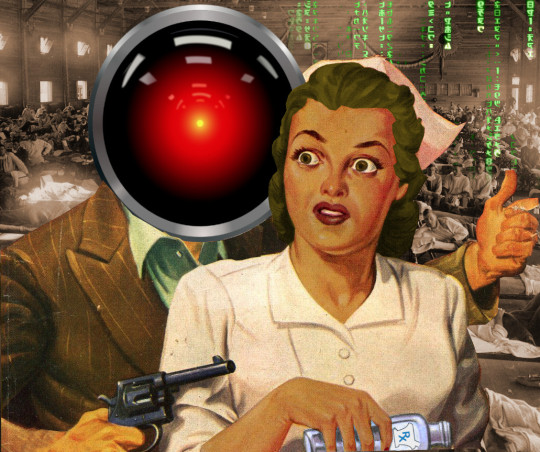
If you'd like an essay-formatted version of this post to read or share, here's a link to it on pluralistic.net, my surveillance-free, ad-free, tracker-free blog:
https://pluralistic.net/2024/12/17/loose-flapping-ends/#luigi-has-a-point

Operating a business is risky: you can't ever be sure how many customers you'll have, or what they'll show up looking for. If you guess wrong, you'll either have too few workers to serve the crowd, or you'll pay workers to stand around and wait for customers. This is true even when your "business" is a "hospital."
Capitalists hate capitalism. Capitalism is defined by risk – like the risk of competitors poaching your customers and workers. Capitalists all secretly dream of a "command economy" in which other people have to arrange their affairs to suit the capitalists' preferences, taking the risk off their shoulders. Capitalists love anti-competitive exclusivity deals with suppliers, and they really love noncompete "agreements" that ban their workers from taking better jobs:
https://pluralistic.net/2023/04/21/bondage-fees/#doorman-building
One of the sleaziest, most common ways for capitalists to shed risk is by shifting it onto their workers' shoulders, for example, by sending workers home on slow days and refusing to pay them for the rest of their shifts. This is easy for capitalists to do because workers have a collective action problem: for workers to force their bosses not to do this, they all have to agree to go on strike, and other workers have to honor their picket-lines. That's a lot of chivvying and bargaining and group-forming, and it's very hard. Meanwhile, the only person the boss needs to convince to screw you this way is themself.
Libertarians will insist that this is impossible, of course, because workers will just quit and go work for someone else when this happens, and so bosses will be disciplined by the competition to find workers willing to put up with their bullshit. Of course, these same libertarians will tell you that it should be legal for your boss to require you to sign a noncompete "agreement" so you can't quit and get a job elsewhere in your field. They'll also tell you that we don't need antitrust enforcement to prevent your boss from buying up all the businesses you might work for if you do manage to quit.
In practice, the only way workers have successfully resisted being burdened with their bosses' risks is by a) forming a union, and then b) using the union to lobby for strong labor laws. Labor laws aren't a substitute for a union, but they are an important backstop, and of course, if you're not unionized, labor law is all you've got.
Enter the tech-bro, app in hand. The tech-bro's most absurd (and successful) ruse is "it's not a crime, I did it with an app." As in "it's not money-laundering, I did it with an app." Or "it's not a privacy violation, I did it with an app." Or "it's not securities fraud, I did it with an app." Or "it's not price-gouging, I did it with an app," or, importantly, "it's not a labor-law violation, I did it with an app."
The point of the "gig economy" is to use the "did it with an app" trick to avoid labor laws, so that bosses can shift risks onto workers, because capitalists hate capitalism. These apps were first used to immiserate taxi-drivers, and this was so successful that it spawned a whole universe of "Uber for __________" apps that took away labor rights from other kinds of workers, from dog-groomers to carpenters.
One group of workers whose rights are being devoured by gig-work apps is nurses, which is bad news, because without nurses, I would be dead by now.
A new report from the Roosevelt Institute goes deep on the way that nurses' lives are being destroyed by gig work apps that let bosses in America's wildly dysfunctional for-profit health care industry shift risk from bosses to the hardest-working group of health care professionals:
https://rooseveltinstitute.org/publications/uber-for-nursing/
The report's authors interviewed nurses who were employed through three apps: Shiftkey, Shiftmed and Carerev, and reveal a host of risk-shifting, worker-abusing practices that has nurses working for so little that they can't afford medical insurance themselves.
Take Shiftkey: nurses are required to log into Shiftkey and indicate which shifts they are available for, and if they are assigned any of those shifts later but can't take them, their app-based score declines and they risk not being offered shifts in the future. But Shiftkey doesn't guarantee that you'll get work on any of those shifts – in other words, nurses have to pledge not to take any work during the times when Shiftkey might need them, but they only get paid for those hours where Shiftkey calls them out. Nurses assume all the risk that there won't be enough demand for their services.
Each Shiftkey nurse is offered a different pay-scale for each shift. Apps use commercially available financial data – purchased on the cheap from the chaotic, unregulated data broker sector – to predict how desperate each nurse is. The less money you have in your bank accounts and the more you owe on your credit cards, the lower the wage the app will offer you. This is a classic example of what the legal scholar Veena Dubal calls "algorithmic wage discrimination" – a form of wage theft that's supposedly legal because it's done with an app:
https://pluralistic.net/2023/04/12/algorithmic-wage-discrimination/#fishers-of-men
Shiftkey workers also have to bid against one another for shifts, with the job going to the worker who accepts the lowest wage. Shiftkey pays nominal wages that sound reasonable – one nurse's topline rate is $23/hour. But by payday, Shiftkey has used junk fees to scrape that rate down to the bone. Workers have to pay a daily $3.67 "safety fee" to pay for background checks, drug screening, etc. Nevermind that these tasks are only performed once per nurse, not every day – and nevermind that this is another way to force workers to assume the boss's risks. Nurses also pay daily fees for accident insurance ($2.14) and malpractice insurance ($0.21) – more employer risk being shifted onto workers. Workers also pay $2 per shift if they want to get paid on the same day – a payday lending-style usury levied against workers whose wages are priced based on their desperation. Then there's a $6/shift fee nurses pay as a finders' fee to the app, a fee that's up to $7/shift next year. All told, that $23/hour rate cashes out to $13/hour.
On top of that, gig nurses have to pay for their own uniforms, licenses, equipment and equipment, including different colored scrubs and even shoes for each hospital. And because these nurses are "their own bosses" they have to deduct their own payroll taxes from that final figure. As "self-employed" workers, they aren't entitled to overtime or worker's comp, they get no retirement plan, health insurance, sick days or vacation.
The apps sell themselves to bosses as a way to get vetted, qualified nurses, but the entire vetting process is automated. Nurses upload a laundry list of documents related to their qualifications and undergo a background check, but are never interviewed by a human. They are assessed through automated means – for example, they have to run a location-tracking app en route to callouts and their reliability scores decline if they lose mobile data service while stuck in traffic.
Shiftmed docks nurses who cancel shifts after agreeing to take them, but bosses who cancel on nurses, even at the last minute, get away at most a small penalty (having to pay for the first two hours of a canceled shift), or, more often, nothing at all. For example, bosses who book nurses through the Carerev app can cancel without penalty on a mere two hours' notice. One nurse quoted in the study describes getting up at 5AM for a 7AM shift, only to discover that the shift was canceled while she slept, leaving her without any work or pay for the day, after having made arrangements for her kid to get childcare. The nurse assumes all the risk again: blocking out a day's work, paying for childcare, altering her sleep schedule. If she cancels on Carerev, her score goes down and she will get fewer shifts in the future. But if the boss cancels, he faces no consequences.
Carerev also lets bosses send nurses home early without paying them for the whole day – and they don't pay overtime if a nurse stays after her shift ends in order to ensure that their patients are cared for. The librarian scholar Fobazi Ettarh coined the term "vocational awe" to describe how workers in caring professions will endure abusive conditions and put in unpaid overtime because of their commitment to the patrons, patients, and pupils who depend on them:
https://www.inthelibrarywiththeleadpipe.org/2018/vocational-awe/
Many of the nurses in the study report having shifts canceled on them as they pull into the hospital parking lot. Needless to say, when your shift is canceled just as it was supposed to start, it's unlikely you'll be able to book a shift at another facility.
The American healthcare industry is dominated by monopolies. First came the pharma monopolies, when pharma companies merged and merged and merged, allowing them to screw hospitals with sky-high prices. Then the hospitals gobbled each other up, merging until most regions were dominated by one or two hospital chains, who could use buyer power to get a better deal on pharma prices – but also use seller power to screw the insurers with outrageous prices for care. So the insurers merged, too, until they could fight hospital price-gouging.
Everywhere you turn in the healthcare industry, you find another monopolist: pharmacists and pharmacy benefit managers, group purchasing organizations, medical beds, saline and supplies. Monopoly begets monopoly.
(Unitedhealthcare is extraordinary in that its divisions are among the most powerful players in all of these sectors, making it a monopolist among monopolists – for example, UHC is the nation's largest employer of physicians:)
https://www.thebignewsletter.com/p/its-time-to-break-up-big-medicine
But there two key stakeholders in American health-care who can't monopolize: patients and health-care workers. We are the disorganized, loose, flapping ends at the beginning and end of the healthcare supply-chain. We are easy pickings for the monopolists in the middle, which is why patients pay more for worse care every year, and why healthcare workers get paid less for worse working conditions every year.
This is the one area where the Biden administration indisputably took action, bringing cases, making rules, and freaking out investment bankers and billionaires by repeatedly announcing that crimes were still crimes, even if you used an app to commit them.
The kind of treatment these apps mete out to nurses is illegal, app or no. In an important speech just last month, FTC commissioner Alvaro Bedoya explained how the FTC Act empowered the agency to shut down this kind of bossware because it is an "unfair and deceptive" form of competition:
https://pluralistic.net/2024/11/26/hawtch-hawtch/#you-treasure-what-you-measure
This is the kind of thing the FTC could be doing. Will Trump's FTC actually do it? The Trump campaign called the FTC "politicized" – but Trump's pick for the next FTC chair has vowed to politicize it even more:
https://theintercept.com/2024/12/18/trump-ftc-andrew-ferguson-ticket-fees/
Like Biden's FTC, Trump's FTC will have a target-rich environment if it wants to bring enforcement actions on behalf of workers. But Biden's trustbusters chose their targets by giving priority to the crooked companies that were doing the most harm to Americans, while Trump's trustbusters are more likely to give priority to the crooked companies that Trump personally dislikes:
https://pluralistic.net/2024/11/12/the-enemy-of-your-enemy/#is-your-enemy
So if one of these nursing apps pisses off Trump or one of his cronies, then yeah, maybe those nurses will get justice.

Image: Cryteria (modified) https://commons.wikimedia.org/wiki/File:HAL9000.svg
CC BY 3.0 https://creativecommons.org/licenses/by/3.0/deed.en
#pluralistic#nursing#labor#algorithmic wage discrimination#uber for nurses#wage theft#gig economy#accountability sinks#precaratization#health#health care#usausausa#guillotine watch#monopolies#ai#roosevelt institute#shiftkey#shiftmed#carerev
414 notes
·
View notes
Text
Krakoan Diaspora floods the labour market
Okay everybody shut up, Astonishing X-Men Infinity Comic #13 said something interesting.

Fuck Mr Toppi. Get him, Chris.
This situation is a newly introduced C plot that I have a feeling will connect to the A plot soon. This guy on the right is Nick. He's a construction worker of some kind who is behind on child support and is getting fired right now. It's painful to watch this guy lick boot as this capitalist pig blatantly tells him his labour isn't cheap enough due to an influx of exploitable geographically external workers. It's an old lie, easily believed.
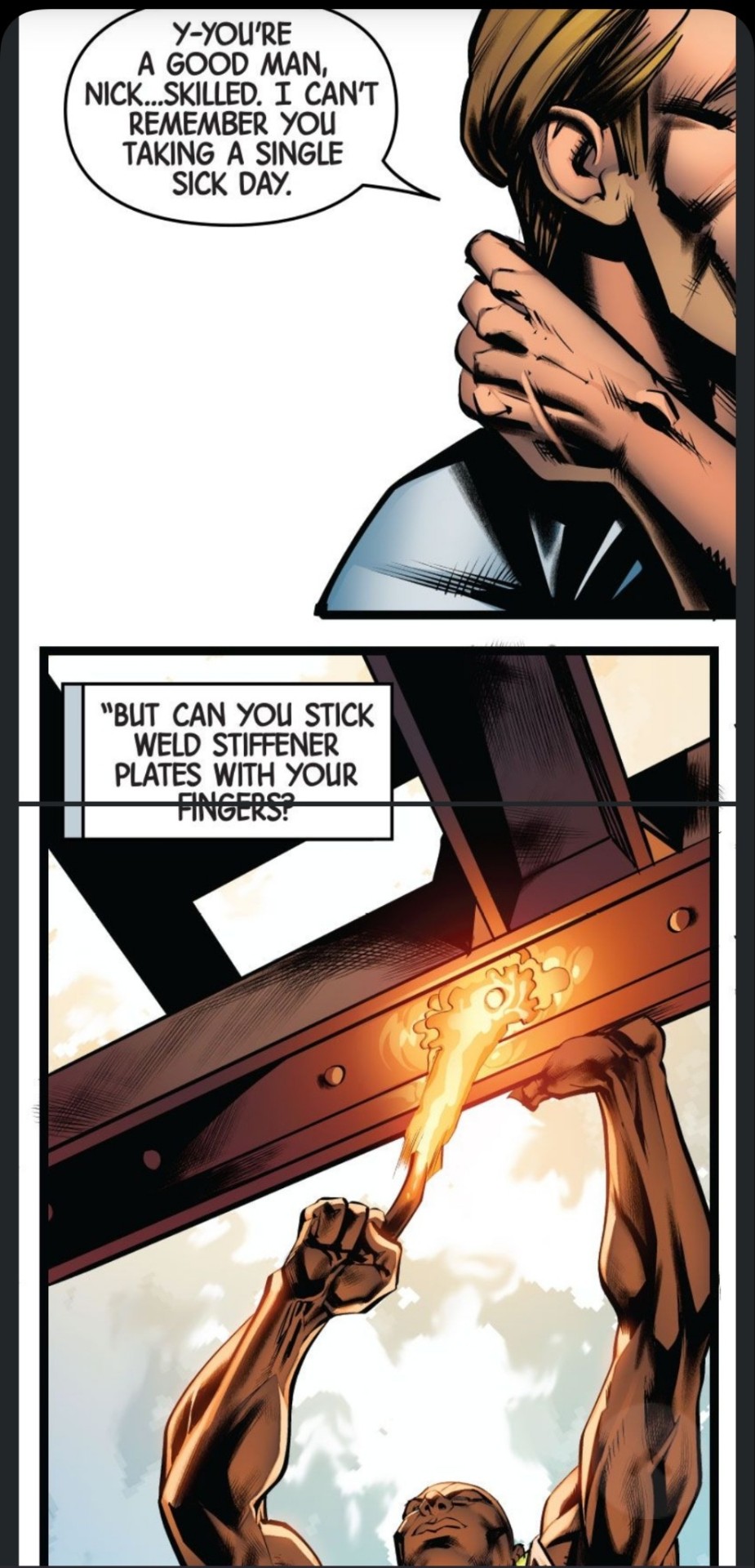
I see you Marvel, making these workers dark skinned to cover your bases. We find out Nick's a good worker, has never taken a sick day, defends those stealing his labour, and either didn't join a union or did but is really sorry about it. It's not 100% clear. Either way none of that shit matters because there's cheaper labour available.

The company doesn't see you as a person
It's implied to be an industry-wide thing, at least locally - mutant work crews are utilising their hyperspecific powers in concert to finish jobs way quicker than any human possibly could. It's implied that they don't own their own labour and are being exploited - the mutant workers are drastically increasing profits, they're 'fast' but they're being paid the same hourly rate, they're 'cheap.'
The parasite class, like Murray here, are making fat stacks by employing mutants to finish jobs quicker. The mutants get paid the same as less efficient workers and not sharing the increased profits their labour generates. The labour supply and dividends are so high, either from increased profit per worker or high numbers of mutant workers (likely both,) that they're cutting human workers altogether.

'Thousands of desperate mutants to exploit, Nick'
The parasite class are also employing a favourite tactic - keeping focus off their greed (and probable illegal practices) by scapegoating the migrant mutant workers. Instead of slaying this man and redistributing stolen wealth, Nick's anger is directed at his working class brother. Nick really should have joined that union, or should consult it if he's a member. Striking is ineffective when your labor is no longer required, but these mutant workers have collective bargaining power. Ideally, they'd be class conscious and strike in solidarity with their human brothers, but I don't think this is that kind of story.

Never forget Murray is the enemy
Skin here is an exploited mutant worker. There's no indication he's scabbing, just existing in the same labour market as Nick. He's being paid far less than his labour produces, and blamed for Murray being a greedy fuck. Both workers need money to live under capitalism yet they're set at odds with each other. Mutant workers could be migrants or automation - the parasites do not care about anything except the numbers going up, and they use any available resource for that. Oppression is no guarantee of intersectional solidarity, sadly.
This relaunch of the Infinity Comics has had a very consistent theme - radicalisation of the vulnerable by the predatory. I'll continue to cover this arc as the issues drop as it's an interesting and relevant choice of focus. I hope that conflict leads to understanding and solidarity, but I doubt it. The true big bad here is capitalism, but the villain is Murray, not Nick. I'm wary that Nick is dark skinned to sidestep angry white guy shouting 'they took our jobs,' but another theme of this run has been people slipping through the cracks.
People who are suffering or who have been wronged facing violence and imprisonment when they need support. Folks ground down by a rigged system lashing out at the dehumanised other. It's certainly true to life, but Murray the capitalist is safe in this narrative, as in life. It's possible he'll be secretly a supervillain, demon, gangster etc and become an acceptable villain to topple - but as long as he's just a banal greedy fuck - a very legal thing to be, he'll prosper while the workers suffer and fight each other. Your boss and the company are nobody's friends. They are very good at wearing the shell of a person to exploit loyalty, but they get fat off your labor and will discard as soon as it's profitable.
A Mr Toppi is mentioned in the story as presumably the owner. You'll notice that he's not working, performing no labour yet owns a very profitable business. Mr Toppi has capital. Know your rights and build solidarity with other workers because they're the same as you. I know this is cliché but there's so many more of us than there are of them. The individual is replaceable but the working class is not. Also, don't scab.
#skin#x comics#x men#infinity comics#capitalism#wage theft#parasite#workers of the world unite#marvel#comics#from the ashes
85 notes
·
View notes
Text


#politics#education#living wages#tuition#minimum wage#inequality#wage theft#social safety net#college should be free
993 notes
·
View notes
Text

182 notes
·
View notes
Text

#class war#class warfare#classism#wage theft#theft#illegally kept#marriotthotels#marriottbonvoy#jw marriott
8K notes
·
View notes
Text
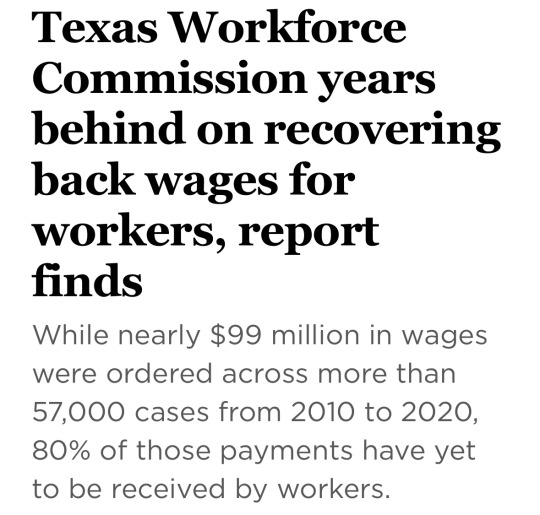
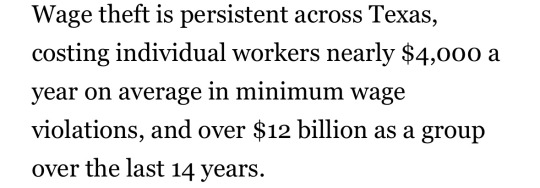
Source
#capitalism#eat the rich#Texas#minimum wage#working class#workers rights#unions#unionize#government#news#current events#wage theft#the left
1K notes
·
View notes
Note
Hi there! I'm not sure if this is the right blog to ask, but it can't hurt, right?
I have the feeling my employer is fucking with my wages, but I can't put my finger on how exactly. Every time I ask, they keep shooting some weird math at me at rapid speed, and it all seems reasonable, but by the end of the month I always end up with less than my contract had promised. Do you have any general, not USA-only advice on how to deal with that? (I'm writing from Italy).
I was thinking of maybe going to the union office and asking for a consultation, but my mom keeps telling me that "everyone in the business know each other", "gossip travels at the speed of light" and "you don't want to be known as a troublemaker". Idk if her fears are reasonable. What makes the situation more difficult is that I'm not part of the union and I'm not sure if it's something I can do - I only have an internship contract (for a whole year. what a joke.).
If it matters, the job is hotel receptionist.
This is my first serious full time job, and I'm feeling pretty lost. Is there something I could do, or should I just grit my teeth and keep my head down?
First off honey, ignore your mom. WE are your mom now. And we say troublemakers GET SHIT DONE! The kind of things your mom is saying is what employers count on when they try to take advantage of their employees.
Second, we recommend getting printed copies of your pay stubs (this should be a thing in most countries) if you haven't already. This should be a written record of your pay, the hours you've worked, and what has been taken out for taxes and other benefits. If your employer can't provide this written record, then go to the union office. Explain your situation as a temporary intern and see what advice they have for you.
Wage theft is a HUGE problem. It's way more common than most people think. And it's infuriating. More on that in the link below.
Buona fortuna!
Season 4, Episode 11: “My Boss Kept My Tips. Is That Legal—or Did She Steal From Me?”
Did we just help you out? Say thanks by joining our Patreon!
63 notes
·
View notes
Text
The rich are taking your life

and the thieves have not only been stealing working class lives through inequitable wealth-sharing with those who create actual value, these billionaires are now attempting to steal the entire careers of millions of dedicated federal workers
59 notes
·
View notes
Text
The cod-Marxism of personalized pricing
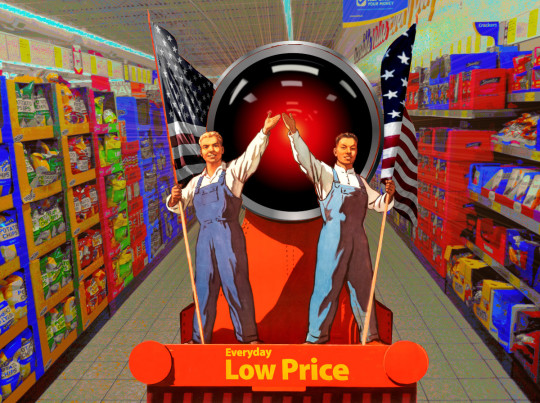
Picks and Shovels is a new, standalone technothriller starring Marty Hench, my two-fisted, hard-fighting, tech-scam-busting forensic accountant. You can pre-order it on my latest Kickstarter, which features a brilliant audiobook read by Wil Wheaton.

The social function of the economics profession is to explain, over and over again, that your boss is actually right and that you don't really want the things you want, and you're secretly happy to be abused by the system. If that wasn't true, why would your "choose" commercial surveillance, abusive workplaces and other depredations?
In other words, economics is the "look what you made me do" stick that capitalism uses to beat us with. We wouldn't spy on you, rip you off or steal your wages if you didn't choose to use the internet, shop with monopolists, or work for a shitty giant company. The technical name for this ideology is "public choice theory":
https://pluralistic.net/2022/06/05/regulatory-capture/
Of all the terrible things that economists say we all secretly love, one of the worst is "price discrimination." This is the idea that different customers get charged different amounts based on the merchant's estimation of their ability to pay. Economists insist that this is "efficient" and makes us all better off. After all, the marginal cost of filling the last empty seat on the plane is negligible, so why not sell that seat for peanuts to a flier who doesn't mind the uncertainty of knowing whether they'll get a seat at all? That way, the airline gets extra profits, and they split those profits with their customers by lowering prices for everyone. What's not to like?
Plenty, as it turns out. With only four giant airlines who've carved up the country so they rarely compete on most routes, why would an airline use their extra profits to lower prices, rather than, say, increasing their dividends and executive bonuses?
For decades, the airline industry was the standard-bearer for price discrimination. It was basically impossible to know how much a plane ticket would cost before booking it. But even so, airlines were stuck with comparatively crude heuristics to adjust their prices, like raising the price of a ticket that didn't include a Saturday stay, on the assumption that this was a business flyer whose employer was footing the bill:
https://pluralistic.net/2024/06/07/drip-drip-drip/#drip-off
With digitization and mass commercial surveillance, we've gone from pricing based on context (e.g. are you buying your ticket well in advance, or at the last minute?) to pricing based on spying. Digital back-ends allow vendors to ingest massive troves of commercial surveillance data from the unregulated data-broker industry to calculate how desperate you are, and how much money you have. Then, digital front-ends – like websites and apps – allow vendors to adjust prices in realtime based on that data, repricing goods for every buyer.
As digital front-ends move into the real world (say, with digital e-ink shelf-tags in grocery stores), vendors can use surveillance data to reprice goods for ever-larger groups of customers and types of merchandise. Grocers with e-ink shelf tags reprice their goods thousands of times, every day:
https://pluralistic.net/2024/03/26/glitchbread/#electronic-shelf-tags
Here's where an economist will tell you that actually, your boss is right. Many groceries are perishable, after all, and e-ink shelf tags allow grocers to reprice their goods every minute or two, so yesterday's lettuce can be discounted every fifteen minutes through the day. Some customers will happily accept a lettuce that's a little gross and liztruss if it means a discount. Those customers get a discount, the lettuce isn't thrown out at the end of the day, and everyone wins, right?
Well, sure, if. If the grocer isn't part of a heavily consolidated industry where competition is a distant memory and where grocers routinely collude to fix prices. If the grocer doesn't have to worry about competitors, why would they use e-ink tags to lower prices, rather than to gouge on prices when demand surges, or based on time of day (e.g. making frozen pizzas 10% more expensive from 6-8PM)?
And unfortunately, groceries are one of the most consolidated sectors in the modern world. What's more, grocers keep getting busted for colluding to fix prices and rip off shoppers:
https://www.cbc.ca/news/business/loblaw-bread-price-settlement-1.7274820
Surveillance pricing is especially pernicious when it comes to apps, which allow vendors to reprice goods based not just on commercially available data, but also on data collected by your pocket distraction rectangle, which you carry everywhere, do everything with, and make privy to all your secrets. Worse, since apps are a closed platform, app makers can invoke IP law to criminalize anyone who reverse-engineers them to figure out how they're ripping you off. Removing the encryption from an app is a potential felony punishable by a five-year prison sentence and a $500k fine (an app is just a web-page skinned in enough IP to make it a crime to install a privacy blocker on it):
https://pluralistic.net/2024/08/15/private-law/#thirty-percent-vig
Large vendors love to sell you shit via their apps. With an app, a merchant can undetectably change its prices every few seconds, based on its estimation of your desperation. Uber pioneered this when they tweaked the app to raise the price of a taxi journey for customers whose batteries were almost dead. Today, everyone's getting in on the act. McDonald's has invested in a company called Plexure that pitches merchants on the use case of raising the cost of your normal breakfast burrito by a dollar on the day you get paid:
https://pluralistic.net/2024/06/05/your-price-named/#privacy-first-again
Surveillance pricing isn't just a matter of ripping off customers, it's also a way to rip off workers. Gig work platforms use surveillance pricing to titrate their wage offers based on data they buy from data brokers and scoop up with their apps. Veena Dubal calls this "algorithmic wage discrimination":
https://pluralistic.net/2023/04/12/algorithmic-wage-discrimination/#fishers-of-men
Take nurses: increasingly, American hospitals are firing their waged nurses and replacing them with gig nurses who are booked in via an app. There's plenty of ways that these apps abuse nurses, but the most ghastly is in how they price nurses' wages. These apps buy nurses' financial data from data-brokers so they can offer lower wages to nurses with lots of credit card debt, on the grounds that crushing debt makes nurses desperate enough to accept a lower wage:
https://pluralistic.net/2024/12/18/loose-flapping-ends/#luigi-has-a-point
This week, the excellent Lately podcast has an episode on price discrimination, in which cohost Vass Bednar valiantly tries to give economists their due by presenting the strongest possible case for charging different prices to different customers:
https://www.theglobeandmail.com/podcasts/lately/article-the-end-of-the-fixed-price/
Bednar really tries, but – as she later agrees – this just isn't a very good argument. In fact, the only way charging different prices to different customers – or offering different wages to different workers – makes sense is if you're living in a socialist utopia.
After all, a core tenet of Marxism is "from each according to his ability, to each according to his needs." In a just society, people who need more get more, and people who have less, pay less:
https://en.wikipedia.org/wiki/From_each_according_to_his_ability,_to_each_according_to_his_needs
Price discrimination, then, is a Bizarro-world flavor of cod-Marxism. Rather than having a democratically accountable state that sets wages and prices based on need and ability, price discrimination gives this authority to large firms with pricing power, no regulatory constraints, and unlimited access to surveillance data. You couldn't ask for a neater example of the maxim that "What matters isn't what technology does. What matters is who it does it for; and who it does it to."
Neoclassical economists say that all of this can be taken care of by the self-correcting nature of markets. Just give consumers and workers "perfect information" about all the offers being made for their labor or their business, and things will sort themselves out. In the idealized models of perfectly spherical cows of uniform density moving about on a frictionless surface, this does work out very well:
https://pluralistic.net/2023/04/03/all-models-are-wrong/#some-are-useful
But while large companies can buy the most intimate information imaginable about your life and finances, IP law lets them capture the state and use it to shut down any attempts you make to discover how they operate. When an app called Para offered Doordash workers the ability to preview the total wage offered for a job before they accepted it, Doordash threatened them with eye-watering legal penalties, then threw dozens of full-time engineers at them, changing the app several times per day to shut out Para:
https://pluralistic.net/2021/08/07/hr-4193/#boss-app
And when an Austrian hacker called Mario Zechner built a tool to scrape online grocery store prices – discovering clear evidence of price-fixing conspiracies in the process – he was attacked by the grocery cartel for violating their "IP rights":
https://pluralistic.net/2023/09/17/how-to-think-about-scraping/
This is Wilhoit's Law in action:
Conservatism consists of exactly one proposition, to wit: There must be in-groups whom the law protects but does not bind, alongside out-groups whom the law binds but does not protect.
https://en.wikipedia.org/wiki/Francis_M._Wilhoit#Wilhoit's_law
Of course, there wouldn't be any surveillance pricing without surveillance. When it comes to consumer privacy, America is a no-man's land. The last time Congress passed a new consumer privacy law was in 1988, when they enacted the Video Privacy Protection Act, which bans video-store clerks from revealing which VHS cassettes you take home. Congress has not addressed a single consumer privacy threat since Die Hard was still playing in theaters.
Corporate bullies adore a regulatory vacuum. The sleazy data-broker industry that has festered and thrived in the absence of a modern federal consumer privacy law is absolutely shameless. For example, every time an app shows you an ad, your location is revealed to dozens of data-brokers who pretend to be bidding for the right to show you an ad. They store these location data-points and combine them with other data about you, which they sell to anyone with a credit card, including stalkers, corporate spies, foreign governments, and anyone hoping to reprice their offerings on the basis of your desperation:
https://www.404media.co/candy-crush-tinder-myfitnesspal-see-the-thousands-of-apps-hijacked-to-spy-on-your-location/
Under Biden, the outgoing FTC did incredible work to fill this gap, using its authority under Section 5 of the Federal Trade Commission Act (which outlaws "unfair and deceptive" practices) to plug some of the worst gaps in consumer privacy law:
https://pluralistic.net/2024/07/24/gouging-the-all-seeing-eye/#i-spy
And Biden's CFPB promulgated a rule that basically bans data brokers:
https://pluralistic.net/2024/06/10/getting-things-done/#deliverism
But now the burden of enforcing these rules falls to Trump's FTC, whose new chairman has vowed to end the former FTC's "war on business." What America desperately needs is a new privacy law, one that has a private right of action (so that individuals and activist groups can sue without waiting for a public enforcer to take up their causes) and no "pre-emption" (so that states can pass even stronger privacy laws):
https://www.eff.org/deeplinks/2022/07/federal-preemption-state-privacy-law-hurts-everyone
How will we get that law? Through a coalition. After all, surveillance pricing is just one of the many horrors that Americans have to put up with thanks to America's privacy law gap. The "privacy first" theory goes like this: if you're worried about social media's impact on teens, or women, or old people, you should start by demanding a privacy law. If you're worried about deepfake porn, you should start by demanding a privacy law. If you're worried about algorithmic discrimination in hiring, lending, or housing, you should start by demanding a privacy law. If you're worried about surveillance pricing, you should start by demanding a privacy law. Privacy law won't entirely solve all these problems, but none of them would be nearly as bad if Congress would just get off its ass and catch up with the privacy threats of the 21st century. What's more, the coalition of everyone who's worried about all the harms that arise from commercial surveillance is so large and powerful that we can get Congress to act:
https://pluralistic.net/2023/12/06/privacy-first/#but-not-just-privacy
Economists, meanwhile, will line up to say that this is all unnecessary. After all, you "sold" your privacy when you clicked "I agree" or walked under a sign warning you that facial recognition was in use in this store. The market has figured out what you value privacy at, and it turns out, that value is nothing. Any kind of privacy law is just a paternalistic incursion on your "freedom to contract" and decide to sell your personal information. It is "market distorting."
In other words, your boss is right.

Check out my Kickstarter to pre-order copies of my next novel, Picks and Shovels!

If you'd like an essay-formatted version of this post to read or share, here's a link to it on pluralistic.net, my surveillance-free, ad-free, tracker-free blog:
https://pluralistic.net/2025/01/11/socialism-for-the-wealthy/#rugged-individualism-for-the-poor

Image: Cryteria (modified) https://commons.wikimedia.org/wiki/File:HAL9000.svg
CC BY 3.0 https://creativecommons.org/licenses/by/3.0/deed.en
--
Ser Amantio di Nicolao (modified) https://commons.wikimedia.org/wiki/File:Safeway_supermarket_interior,_Fairfax_County,_Virginia.jpg
CC BY-SA 3.0 https://creativecommons.org/licenses/by-sa/3.0/deed.en
#pluralistic#personalized pricing#surveillance pricing#ad-tech#realtime bidding#rtb#404media#price discrimination#economics#neoclassical economics#efficiency#predatory pricing#surveillance#privacy#wage theft#algorithmic wage discrimination#veena dubal#privacy first
289 notes
·
View notes
Text
53 notes
·
View notes
